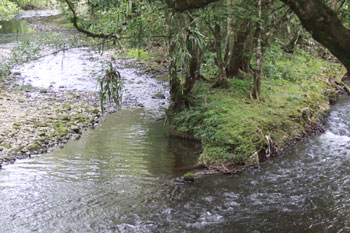Panelists from organizations including the World Bank, CSIS and IICA discussed global challenges to build agricultural systems to accommodate the growing populations in Latin America, South Asia and the Middle East.

Washington D.C. March 22, 2012 (IICA). The Inter-American Institute for Cooperation on Agriculture (IICA) recently participated in the policy roundtable entitled, “Water and Food Security Challenges: Regional Perspectives.” The event was organized by the Center for Strategic and International Studies (CSIS) in Washington D.C. and focused on global challenges needed to meet increased food production, which is expected to double by the year 2050.
Panelists from organizations including the World Bank, CSIS and IICA discussed global challenges to build agricultural systems to accommodate the growing populations in Latin America, South Asia and the Middle East.
According to Priscila Henríquez, IICA specialist in technological innovation, the small farmer in Latin America and the Caribbean (LAC) is most at risk. “Water scarcity will affect mainly the small farmers who depend on rainfall for producing most of the food consumed in Latin America.”
She explained, “Although irrigation is widespread, small farmers usually can’t afford complex systems and some lack the influence required with local authorities to implement irrigation schemes.”
In comparison with other regions, LAC is well endowed with abundant natural resources, including freshwater. However, 60% of the population lives in areas with only 5% water availability. Henríquez reiterated that areas most affected are found in northern and Central Mexico, the Andean Region and the Central American Pacific Coast.
Participants also addressed some challenges around managing competition for water resources due to urbanization and economic development; how best to adapt water systems to stresses, dietary changes, and other uncertainties including climate change.
“Farmers need new and robust strategies for water management,” added Henríquez. “Improved management; water harvesting and storage infrastructure; crop diversification; modern cultivation methods; improved risk management – including agricultural insurance; forecasting and preparedness; integrated coastal zone management and community-based natural resource management, are all key aspects for success.”
Panelists also discussed the important role the United States and the international community can play in partnering with nations to achieve water and food security.
David C. Hatch, IICA’s Representative in the United States, emphasized that there is great opportunity for promoting south-south cooperation and that consideration should be given to replicating some successful experiences found throughout LAC. Hatch also underscored that the US could play a strategic role in promoting this cooperation.
CSIS is one of the world’s preeminent public policy institutions on foreign policy and national security issues. With its traditional defense and security programs, initiatives focused on global challenges such as health and energy, and research projects dedicated to every corner of the IICA’s Priscila Henríquez, participates in CSIS event in Washington, DC. globe, CSIS is well-positioned for another 50 years of providing strategic insights and policy solutions to the world’s decision makers.
For more information, contact:
phenriquez@iicawash.org
dhatch@iicawash.org











